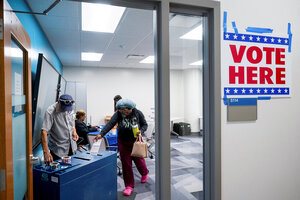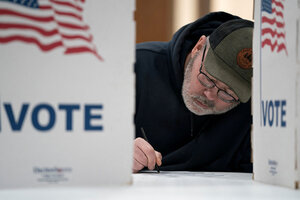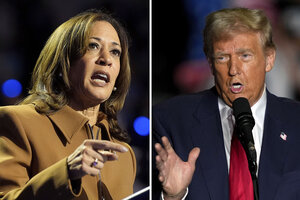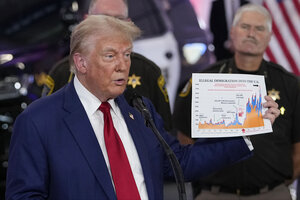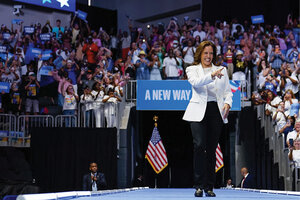Democrats arrive at convention energized by a transformed race
Loading...
| Chicago
“I’m not a member of any organized political party,” humorist Will Rogers once said. “I’m a Democrat.”
That quip, from deep in the last century, has stood the test of time for a party long known for its factions and infighting. Until now.
As the Democratic National Convention (DNC) opens Monday in Chicago, party faithful – for the most part – have a spring in their step. Their onetime standard-bearer, President Joe Biden, is heading into retirement, instead of a campaign slog that appeared doomed to defeat in November.
Why We Wrote This
A last-minute ticket swap has unfolded remarkably smoothly, with Democrats closing ranks around Vice President Kamala Harris. Worries about former President Donald Trump returning to the Oval Office are fueling party unity.
Now, with Vice President Kamala Harris at the top of the ticket, the race against Republican nominee Donald Trump is a dead heat. Democrats suddenly have a fighting chance, and they know it.
The party’s recovery has been eye-popping. In the space of a month, President Biden dropped out of the race, and Vice President Harris moved seamlessly into the nominee spot, tapping Minnesota Gov. Tim Walz as her running mate. Once seen as an awkward campaigner, Ms. Harris has defied expectations, impressing even some critics. Her rally crowds number in the thousands, while a tsunami of fundraising and grassroots volunteering has followed. The momentum shift is having ripple effects: Political handicappers now say Democrats have a shot at winning control of the House, though the Senate is still an uphill battle.
“The energy is real, and it’s going to continue,” says Ann Lewis, a veteran Democratic strategist, who has attended every DNC since 1976. “People are asking, ‘Where should I go? What can I do?’”
Voices of dissent at DNC over war in Gaza
To be sure, voices of dissent will be in the mix. Ms. Lewis, who served as communications director in the Clinton White House, is in Chicago as co-chair of Democratic Majority for Israel, a group promoting strong U.S.-Israel ties. On the other side, pro-Palestinian groups opposed to U.S. aid to Israel amid the war in Gaza have organized a big march Monday outside the DNC, and other protest actions in Chicago are expected throughout the week.
Many of those protesting, of course, may not even be Democrats, but socialists or other left-wing groups. Still, dissident voices over Gaza could ring out inside the convention itself, just as they did at many of Mr. Biden’s – and now Ms. Harris’ – campaign rallies. There will be a small but potentially vocal contingent of “uncommitted” delegates in the arena.
Ms. Harris has already demonstrated a different approach to handling protesters. She listens for a bit, and then sternly shuts them down. Her recent rebuke of pro-Palestinian students who interrupted her at a rally in Detroit was especially sharp. “If you want Donald Trump to win, then say that. Otherwise, I’m speaking,” she said, to roars of approval.
Not the “open convention” some feared
Despite the potential for tumult, political observers marvel at how smoothly the party’s last-minute ticket swap has unfolded. After Mr. Biden’s poor June debate performance, as Democratic officials began leaning on him to leave the race, some worried it would precipitate an even more divisive power struggle. But after Mr. Biden dropped out on July 21, the party closed ranks almost immediately around Ms. Harris as his replacement, avoiding the chaos of an “open convention” that some had feared.
In a multiday, virtual roll-call vote of the DNC’s more than 4,500 delegates, which closed Aug. 5, Ms. Harris won 99% of the vote.
“What we’ve seen here is that, yeah, the Democratic Party is actually way stronger than we thought,” says Seth Masket, a political scientist at the University of Denver and author of a book that showed how the Democrats learned from their 2016 loss.
Mr. Biden’s quick endorsement of Ms. Harris, who is Black and South Asian and would be the nation’s first woman president, effectively ensured her path to the nomination – and with nary a peep from other party power centers.
“There’s no Elizabeth Warren or Bernie Sanders who’s come out and said, ‘No, we need to go in a different direction,’” says William Howell, a political scientist at the University of Chicago, referring to two of the Senate’s outspoken progressives and past presidential contenders. “Everyone seems to have fallen in line and behaved well.”
This is remarkable, he says, given the Democrats’ history of warring factions – including at the party’s 1968 convention, also in Chicago, which was marred by clashes between police and anti-Vietnam War protesters.
Opposition to Trump remains a key motivator
In 2024, fear over the potential return of former President Trump to the Oval Office has played a big part in the coalescing around Ms. Harris, Professor Howell says.
In a few cases, there’s hedging. Three Democratic senators in tough reelection races – Jon Tester of Montana, Sherrod Brown of Ohio, and Jacky Rosen of Nevada – are skipping the convention, as are a handful of House Democrats in toss-up races. Of the three senators not coming, one – Senator Tester – has yet to endorse Ms. Harris. But the overarching show of party unity in Chicago leaves room for a few elected officials to stand back.
Ms. Harris has also benefited from inheriting a well-oiled Biden campaign operation – including field offices, staff, and volunteers.
Still, although there are only 2 1/2 months to go until Election Day, it’s too soon to say the trajectory of the race has permanently changed, says Republican pollster Whit Ayres. Much will happen between now and Nov. 5.
“Basically, what we have is an enormous burst of enthusiasm from Democrats who are relieved that they’re not having to run with Joe Biden at the top of their ticket,” he says.







